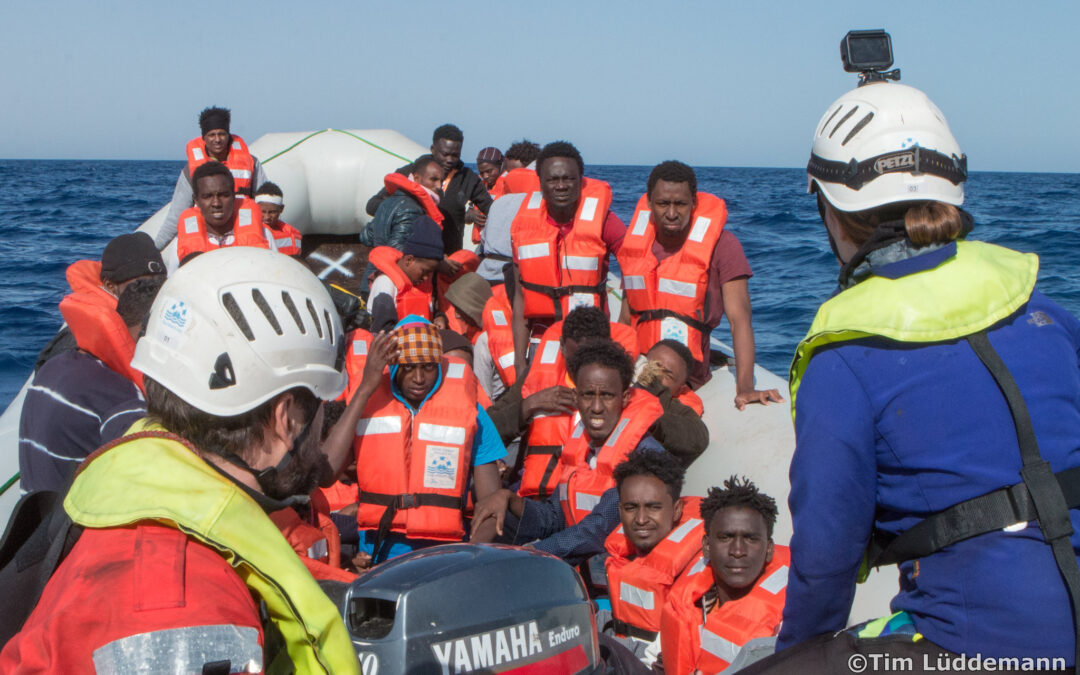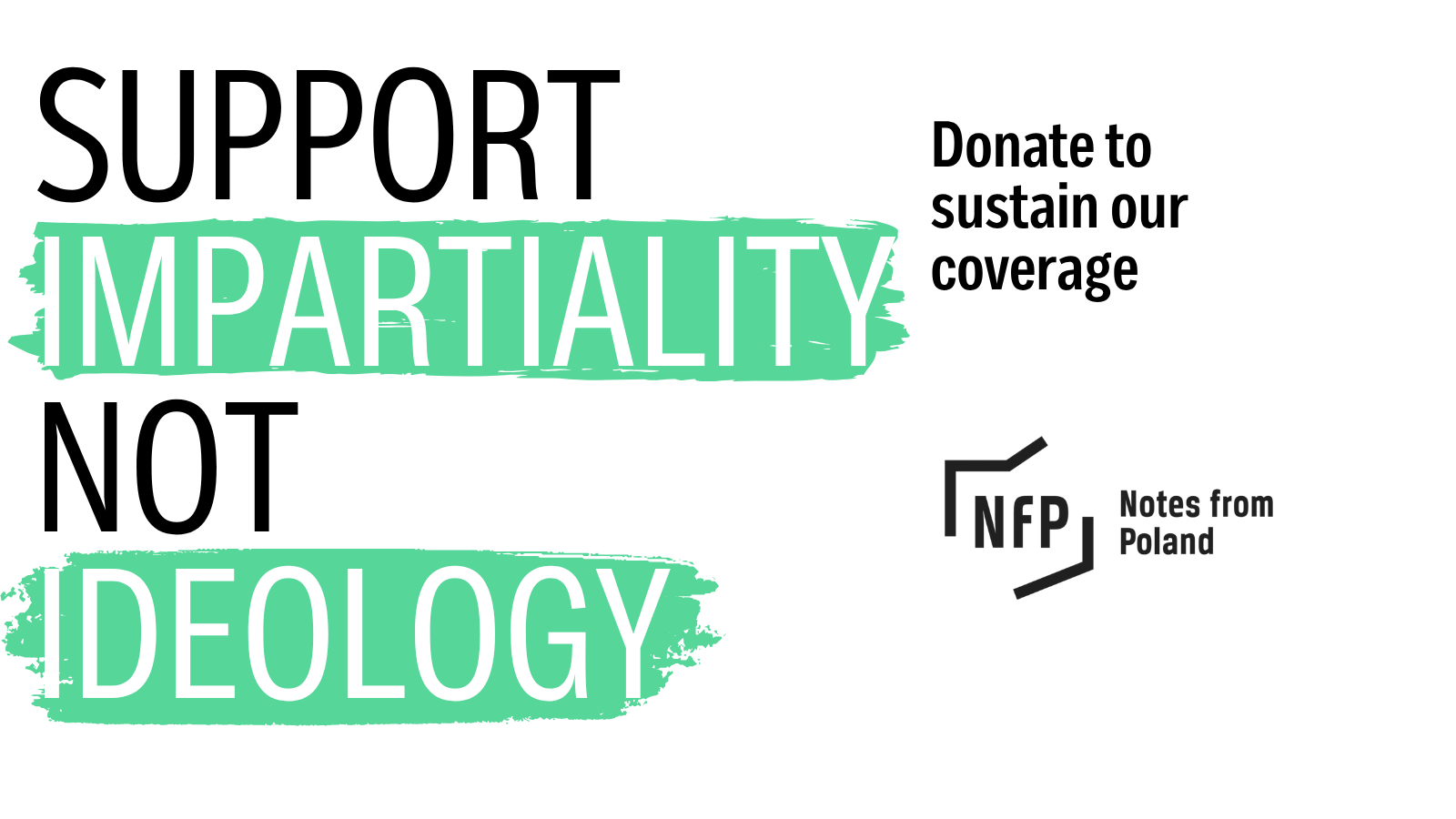Keep our news free from ads and paywalls by making a donation to support our work!

Notes from Poland is run by a small editorial team and is published by an independent, non-profit foundation that is funded through donations from our readers. We cannot do what we do without your support.
The European Commission has named Poland among the EU member states it wants to be fully or partially exempt from receiving quotas of migrants relocated from elsewhere in the bloc under the new migration pact. It says that Poland already faces a “significant migratory situation”.
The proposal, which still requires approval by the European Council, has been hailed as a success by the Polish government, which says that the EU has taken account of Poland’s role in hosting large numbers of Ukrainian refugees as well as the migration crisis it faces on the Belarusian border.
Tak, jak mówiłem, Polska nie będzie przyjmować migrantów w ramach Paktu Migracyjnego. Ani płacić za to. To już decyzja. Robimy, nie gadamy!
— Donald Tusk (@donaldtusk) November 11, 2025
The EU Pact on Migration and Asylum was adopted last year – despite opposition from Poland – and goes into force over the following two years. One element is a so-called “solidarity framework” that requires other member states to help those receiving large numbers of migrants.
They can do so by taking in a share of those migrants or by paying €20,000 for each they do not take. However, countries that are themselves deemed as being “under migratory pressure” are exempted from providing such solidarity.
Poland has long argued that, given its role in taking in Ukrainian refugees since Russia’s invasion, as well as the migration crisis it faces on the border with Belarus, it should be granted such an exemption. As far back as 2023, the European Commission indicated that it would be.
On Tuesday, the commission launched its first “migration management cycle” under the new pact. It placed member states in various categories based on their individual situations.
Greece, Spain, Italy and Cyprus were classified as being “under migratory pressure” and therefore eligible for “solidarity” support given the large number of migrant arrivals they have experienced over the last year.
Meanwhile, 12 countries – including Poland – were identified as “at risk of migratory pressure” due to the number of arrivals, strains on their reception systems, or “the threat of weaponisation of migration” (a term for when foreign actors, such as Belarus and Russia, use migrants to destabilise EU countries).
Those countries are therefore eligible to receive priority support from the so-called EU Migration Support Toolbox, which provides operational, technical and financial assistance. Those also facing “hybrid threats and increasing drone incursions”, such as Poland, will receive additional drone and anti-drone support.
Finally, six member states – Poland, Bulgaria, the Czech Republic, Estonia, Croatia and Austria – were deemed to face a “significant migratory situation because of the cumulative pressures of the last five years”. They are therefore eligible to apply for full or partial exemptions from providing “solidarity” contributions.
EU chief @vonderleyen has thanked Poland for defending Europe from “cynical hybrid attacks” during a visit with PM @donaldtusk to the border with Belarus.
She emphasised the “urgency” of protecting the EU’s frontier from the “predator” Vladimir Putin https://t.co/O9bhmLha44
— Notes from Poland 🇵🇱 (@notesfrompoland) August 31, 2025
The European Commission’s classifications still require approval by the European Council, which is made up of the individual member states. They are also subject to review in the summer and autumn of 2026.
The specific size of the so-called “solidarity pool” – that is, how many migrants will be relocated or how much money provided to frontline states – has also not yet been made public, notes Euronews. The size of each country’s solidarity share will also be decided by the end of this year.
News service Euractiv notes that discussions over implementation of the pact could see a clash between the southern member states that are deemed under migratory pressure and northern member states, such as Belgium and the Netherlands, that accuse the frontline states of failing to uphold EU asylum rules.
Poland has secured an exemption from accepting relocated migrants under the EU's new migration pact, says the government.
"I said that there would be no relocation of migrants in Poland, and there won’t be!" celebrated Prime Minister @donaldtusk https://t.co/hbMkVK0TNO
— Notes from Poland 🇵🇱 (@notesfrompoland) October 11, 2025
Despite the remaining question marks, Poland’s prime minister, Donald Tusk, hailed yesterday’s announcement as a success. Last month, he had already announced that Poland would be exempted from providing solidarity.
“As I said, Poland will not accept migrants under the migration pact. Nor pay for them,” wrote Tusk on social media on Tuesday. “That’s already a decision. We act, we don’t [just] talk!”
The deputy interior minister in charge of migration affairs, Maciej Duszczyk, also hailed Tuesday’s announcement as a “huge success for the Polish government”.
“The presence of war refugees from Ukraine and the situation at the border with Belarus have been taken into account [by the EU],” wrote Duszczyk. “This in practice means that Poland is exempt from solidarity for many, many years.”
However, Jarosław Kaczyński, leader of the opposition Law and Justice (PiS) party, argued that Tuesday’s announcement was “nothing new” and simply confirmed that “we are at the mercy of Brussels”, which will issue such migration assessments every year.
Tak jak mówiłem – w sprawie paktu migracyjnego nic nowego. Pakt obowiązuje, a my jesteśmy zdani na łaskę Brukseli. Tak będzie co roku. To było jasne od początku.
— Jarosław Kaczyński (@OficjalnyJK) November 11, 2025
Poland was the primary initial destination for refugees fleeing Russia’s invasion of neighbouring Ukraine in 2022. Almost one million Ukrainian refugees remain in Poland, the highest number anywhere in the EU apart from Germany.
In relation to population, Poland also has the EU’s second-highest number of Ukrainian refugees, behind only the Czech Republic.
Since 2021, Poland has also faced a migration crisis on its border with Belarus, where tens of thousands of migrants and asylum seekers – mainly from Africa, the Middle East and Asia – have tried to cross with the encouragement and assistance of the Belarusian authorities.
Poland has the highest rate of employment for Ukrainian refugees among @OECD countries, at 78%.
It also has one of the highest levels of employment among immigrants as a whole, new figures show https://t.co/WOM6cVm0wZ
— Notes from Poland 🇵🇱 (@notesfrompoland) November 5, 2025

Notes from Poland is run by a small editorial team and published by an independent, non-profit foundation that is funded through donations from our readers. We cannot do what we do without your support.
Main image credit: Tim Lüddemann/Flickr (under CC BY-NC-SA 2.0)

Daniel Tilles is editor-in-chief of Notes from Poland. He has written on Polish affairs for a wide range of publications, including Foreign Policy, POLITICO Europe, EUobserver and Dziennik Gazeta Prawna.




















